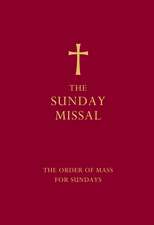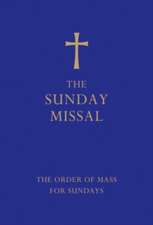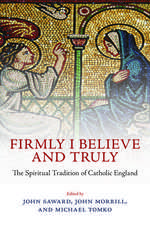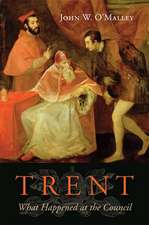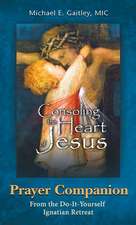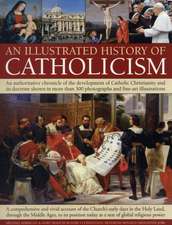Hans Urs Von Balthasar and Protestantism
Autor Rodney Howsareen Limba Engleză Paperback – 31 iul 2005
Preț: 464.04 lei
Preț vechi: 573.66 lei
-19% Nou
Puncte Express: 696
Preț estimativ în valută:
88.80€ • 94.95$ • 74.03£
88.80€ • 94.95$ • 74.03£
Carte tipărită la comandă
Livrare economică 18 aprilie-02 mai
Preluare comenzi: 021 569.72.76
Specificații
ISBN-13: 9780567030207
ISBN-10: 0567030202
Pagini: 256
Dimensiuni: 138 x 216 x 18 mm
Greutate: 0.31 kg
Editura: Bloomsbury Publishing
Colecția T&T Clark
Locul publicării:London, United Kingdom
ISBN-10: 0567030202
Pagini: 256
Dimensiuni: 138 x 216 x 18 mm
Greutate: 0.31 kg
Editura: Bloomsbury Publishing
Colecția T&T Clark
Locul publicării:London, United Kingdom
Recenzii
"This study is a welcome addition to the growing library of books on von Balthasar." "in setting out so clearly and systematically the ecumenical origins and influences upon his theology, Howsare's book makes a notable contribution to the interpretation of von Balthasar and his wider reception across the ecumenical scene."
"This study shatters any attempt to place Balthasar neatly into oppositional categories, such as 'revelocentric' over 'correlational' or 'conservative' over 'liberal'. In fact, Howsare's suggestion that Balthasar presents a 'revelocentric-correlational' theology is, in my estimation, the most satisfying description to date of the thrust of the Swiss thinker's thought...The author ends the book with the following thought: 'If I have enticed the reader to take a new look at Balthasar by presenting him in a dialogical light, then I feel this study will have accomplished its purpose' (p. 165). This reviewer has been enticed and is convinced that others will be too." Randall S. Rosenberg, Heythrop Journal
Reviewed in Bollettino ballthasariano, 2006
'As an ecumenical theologian, von Balthasar sought to honor the true concerns of Luther and Barth within a richly Catholic context. Balancing a remarkable grasp of the philosophical tradition with a marvelous sympathy for 'the dignity of the particular', Rodney Howsare here presents the heart of the ecumenical achievement of the greatest Catholic theologian of our times. Cardinal von Schönborn has written that the profound reception of the inspiration of the Reformation in von Balthasar is 'a great ecumenical task waiting to be done.' In this very careful yet readable work of genuine dialogue, Howsare has accomplished this blessed task with erudition and grace.'--Raymond Gawronski, SJ, Associate Professor of Theology, Marquette University, Wisconsin, USA
'Dr. Rodney Howsare's new text on Balthasar and the Catholic dialogue with Protestantism fills a much needed gap in the secondary literature on Balthasar. All too often Balthasar's theology is labeled as "confessional" or "dogmatic" and is viewed, therefore, as unsuitable for use in dialogue with the non-Catholic world. Howsare demonstrates that this approach to Balthasar comes loaded with a set of highly debatable "Liberal" assumptions about the proper methodology for theology in an academic setting: namely, that any theology that wants to dialogue with the "other" must begin by first bracketing the specific faith claims of one's own religious tradition and seek after the Archimedean common denominator provided by secular reason. Despite the post-modern critique of this Liberal methodology theologians such as Balthasar who do not make neat distinctions between fundamental and dogmatic theology are still accused of a crypto fideism that must be overcome by the critical reason of the academy. Howsare's text calls this view to task and insists that a properly post-modern understanding of theology must make room for non-Liberal accounts of the nature of Christian rationality. In so doing he makes a strong case for the dialogical and ecumenical relevance of Balthasar's theology and radically challenges the hegemony that "transcendental" approaches have enjoyed over the past half century. A magisterial achievement that should be read by anyone interested in the relevance of Balthasar's theology for contemporary ecumenical discussion.'--Larry Chapp, Associate Professor of Systematic Theology, Desales University, Pennsylvania, USA
'Rodney Howsare's Hans Urs von Balthasar and Protestantism belongs to the exciting new wave of Balthasar studies in which the great Swiss theologian is interpreted rather than simply exposited. Howsare uncovers the ecumenical possibilities of Balthasar's theology by showing how crucial is Balthasar's engagement with the thought of Luther and Barth. Howsare shows with exceptional economy how this engagement helped to promote a positive view of Protestantism, assisted Catholicism in its self-critique, while at the same time sharpening rather than blunting the real differences between Protestantism and Catholicism on such important issues as the relation between nature and grace, creation and redemption, and Christ and culture. In doing so, Balthasar instantiated a mode of ecumencal dialogue that demands attention as we seek away beyond tendentious rhetorical and an accommodationism that respects the integrity neither of Protestantism nor Catholicism. This is a fine book. The voice is intelligent; the treatment of the topic judicious and balanced; the tone civil even when critical; the writing graceful and lucid.'--Cyril O'Regan, Huisking Professor of Theology, University of Notre Dame, Indiana, USA
"This study shatters any attempt to place Balthasar neatly into oppositional categories, such as 'revelocentric' over 'correlational' or 'conservative' over 'liberal'. In fact, Howsare's suggestion that Balthasar presents a 'revelocentric-correlational' theology is, in my estimation, the most satisfying description to date of the thrust of the Swiss thinker's thought...The author ends the book with the following thought: 'If I have enticed the reader to take a new look at Balthasar by presenting him in a dialogical light, then I feel this study will have accomplished its purpose' (p. 165). This reviewer has been enticed and is convinced that others will be too." Randall S. Rosenberg, Heythrop Journal
Reviewed in Bollettino ballthasariano, 2006
'As an ecumenical theologian, von Balthasar sought to honor the true concerns of Luther and Barth within a richly Catholic context. Balancing a remarkable grasp of the philosophical tradition with a marvelous sympathy for 'the dignity of the particular', Rodney Howsare here presents the heart of the ecumenical achievement of the greatest Catholic theologian of our times. Cardinal von Schönborn has written that the profound reception of the inspiration of the Reformation in von Balthasar is 'a great ecumenical task waiting to be done.' In this very careful yet readable work of genuine dialogue, Howsare has accomplished this blessed task with erudition and grace.'--Raymond Gawronski, SJ, Associate Professor of Theology, Marquette University, Wisconsin, USA
'Dr. Rodney Howsare's new text on Balthasar and the Catholic dialogue with Protestantism fills a much needed gap in the secondary literature on Balthasar. All too often Balthasar's theology is labeled as "confessional" or "dogmatic" and is viewed, therefore, as unsuitable for use in dialogue with the non-Catholic world. Howsare demonstrates that this approach to Balthasar comes loaded with a set of highly debatable "Liberal" assumptions about the proper methodology for theology in an academic setting: namely, that any theology that wants to dialogue with the "other" must begin by first bracketing the specific faith claims of one's own religious tradition and seek after the Archimedean common denominator provided by secular reason. Despite the post-modern critique of this Liberal methodology theologians such as Balthasar who do not make neat distinctions between fundamental and dogmatic theology are still accused of a crypto fideism that must be overcome by the critical reason of the academy. Howsare's text calls this view to task and insists that a properly post-modern understanding of theology must make room for non-Liberal accounts of the nature of Christian rationality. In so doing he makes a strong case for the dialogical and ecumenical relevance of Balthasar's theology and radically challenges the hegemony that "transcendental" approaches have enjoyed over the past half century. A magisterial achievement that should be read by anyone interested in the relevance of Balthasar's theology for contemporary ecumenical discussion.'--Larry Chapp, Associate Professor of Systematic Theology, Desales University, Pennsylvania, USA
'Rodney Howsare's Hans Urs von Balthasar and Protestantism belongs to the exciting new wave of Balthasar studies in which the great Swiss theologian is interpreted rather than simply exposited. Howsare uncovers the ecumenical possibilities of Balthasar's theology by showing how crucial is Balthasar's engagement with the thought of Luther and Barth. Howsare shows with exceptional economy how this engagement helped to promote a positive view of Protestantism, assisted Catholicism in its self-critique, while at the same time sharpening rather than blunting the real differences between Protestantism and Catholicism on such important issues as the relation between nature and grace, creation and redemption, and Christ and culture. In doing so, Balthasar instantiated a mode of ecumencal dialogue that demands attention as we seek away beyond tendentious rhetorical and an accommodationism that respects the integrity neither of Protestantism nor Catholicism. This is a fine book. The voice is intelligent; the treatment of the topic judicious and balanced; the tone civil even when critical; the writing graceful and lucid.'--Cyril O'Regan, Huisking Professor of Theology, University of Notre Dame, Indiana, USA

